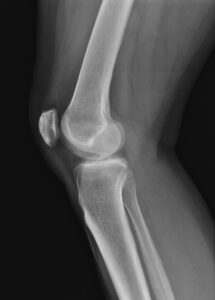The knee is one of the larger and more complex joints in the human body. It serves to connect the femur (thigh bone) to the tibia (shin bone). The knee joint is made up of the femur, patella (kneecap), tibia and fibula. There are several tendons, ligaments and pieces of cartilage that connect the knee bones to surrounding muscles, allow for mobility and absorb shock from running, walking, etc. The ligaments are very susceptible to injury and are the anterior cruciate ligament (ACL), posterior cruciate ligament (PCL) and medial and lateral ligaments. The meniscus is a piece of cartilage separating the thigh bone from the shin bone. If you have suffered a knee injury due to the actions or negligence of another you may be entitled to benefits as well as financial compensation. Ways the knee joint is commonly injured are due to a workplace accident, an automobile or motorcycle accident, playing sports and medical malpractice. To arrange a free case analysis with our knee injury attorneys serving Delaware, Maryland and Washington D.C. please click here. They charge no fees if they do not obtain benefits and compensation for you.
Common Knee Injuries, Diseases & Conditions
As the knee joint is called into action anytime the lower leg is moved it takes a tremendous amount of wear and tear on a daily basis. Even walking can lead to a knee injury so the force upon impact during a fall, auto accident or playing sports makes the odds of injuring your knee that much higher. Some of the knee injuries our Towson, Maryland knee injury attorneys have handled are:
- Chondromalacia patella (also called patellofemoral syndrome): Irritation of the cartilage on the underside of the kneecap (patella), causing knee pain. This is a common cause of knee pain in young people.
- Knee osteoarthritis: Osteoarthritis is the most common form of arthritis, and often affects the knees. Caused by aging and wear and tear of cartilage, osteoarthritis symptoms may include knee pain, stiffness, and swelling.
- Knee effusion: Fluid buildup inside the knee, usually from inflammation. Any form of arthritis or injury may cause a knee effusion.
- Meniscal tear: Damage to a meniscus, the cartilage that cushions the knee, often occurs with twisting the knee. Large meniscus tears may cause the knee to lock.
- ACL (anterior cruciate ligament) strain or tear: The ACL is responsible for a large part of the knee’s stability. An ACL tear often leads to the knee “giving out,” and may require surgical repair.
- PCL (posterior cruciate ligament) strain or tear: PCL tears can cause pain, swelling, and knee instability. These injuries are less common than ACL tears, and physical therapy (rather than surgery) is usually the best option.
- MCL (medial collateral ligament) strain or tear: This injury may cause pain and possible instability to the inner side of the knee.
- Patellar subluxation: The kneecap slides abnormally or dislocates along the thigh bone during activity. Knee pain around the kneecap results.
- Patellar tendonitis: Inflammation of the tendon connecting the kneecap (patella) to the shin bone. This occurs mostly in athletes from repeated jumping.
- Knee bursitis: Pain, swelling, and warmth in any of the bursae of the knee. Bursitis often occurs from overuse or injury.
- Baker’s cyst: Collection of fluid in the back of the knee. Baker’s cysts usually develop from a persistent effusion as in conditions such as arthritis.
- Rheumatoid arthritis: An autoimmune condition that can cause arthritis in any joint, including the knees. If untreated, rheumatoid arthritis can cause permanent joint damage.
- Gout: A form of arthritis caused by buildup of uric acid crystals in a joint. The knees may be affected, causing episodes of severe pain and swelling.
- Pseudogout: A form of arthritis similar to gout, caused by calcium pyrophosphate crystals depositing in the knee or other joints.
- Septic arthritis: An infection caused by bacteria, a virus, or fungus inside the knee can cause inflammation, pain, swelling, and difficulty moving the knee. Although uncommon, septic arthritis is a serious condition that usually gets worse quickly without treatment.
If you have hurt your knee, or its surrounding structures, please connect with our Delaware knee injury attorneys for a free, and in depth, case analysis. They routinely handle these knee accident claims as well as all others.
Procedures & Treatment Of Knee Injuries
- Hip and Knee Arthroscopy
- Hip Corrective Osteotomy
- Hip Resurfacing Surgery
- Cortisone Injections
- Joint Preservation (Osteotomy, Arthroscopy)
- Minimally Invasive Joint Surgery
- Partial Joint Replacement (Hemiarthroplasty)
- Revision Total Joint Surgery
- Total Joint Replacement
- Chiropractics
- Physical Therapy
- Occupational Therapy
While you have trust in your doctors, surgeons and other healthcare providers you see following a knee injury they can sometime make a mistake. If these mistakes lead to further illness or injury you may have grounds for filing a medical malpractice lawsuit according to negligence laws in Delaware, Maryland and Washington D.C. Medical negligence claims involving a knee can be filed against one or more liable parties such as hospitals, orthopedic surgeons, radiologists, orthopedic surgery centers and emergency rooms among others. Cases of medical malpractice are much more complex than workers comp claims so please contact our medical malpractice attorneys handling knee surgery injury lawsuits.
With offices in Wilmington, Delaware and Baltimore, Maryland they serve all of DE, MD & Washington DC including Wilmington, Newark, Dover, Georgetown, Lewes, Seaford, Annapolis, Baltimore, College Park, Rockville, Frederick, Glen Burnie, Catonsville, Randallstown, Towson, Bel Air & Elkton.

